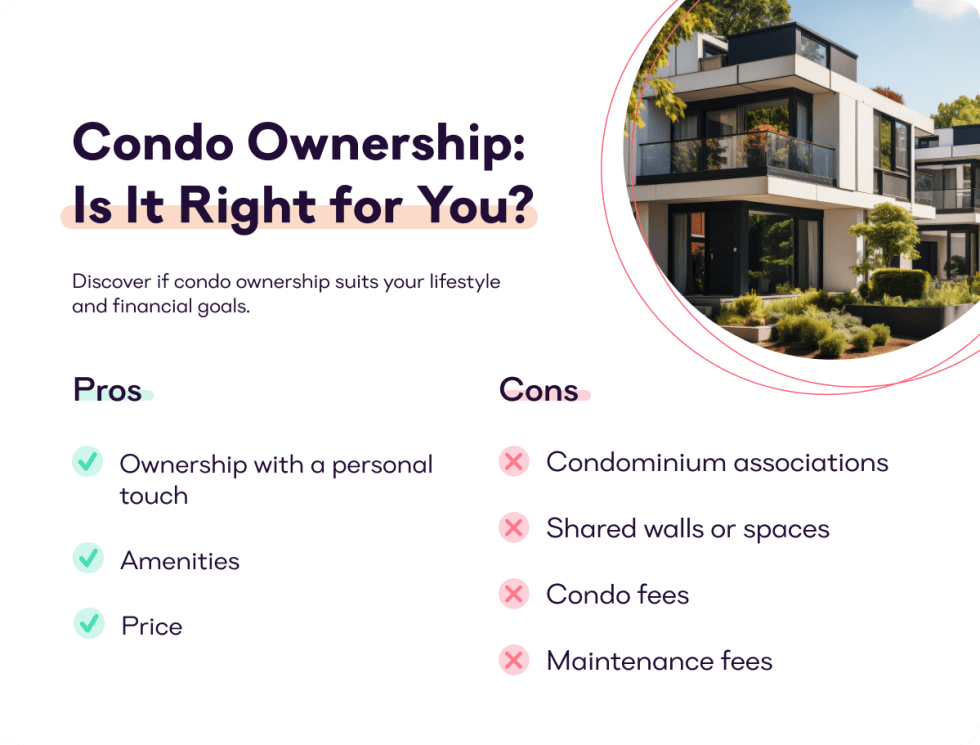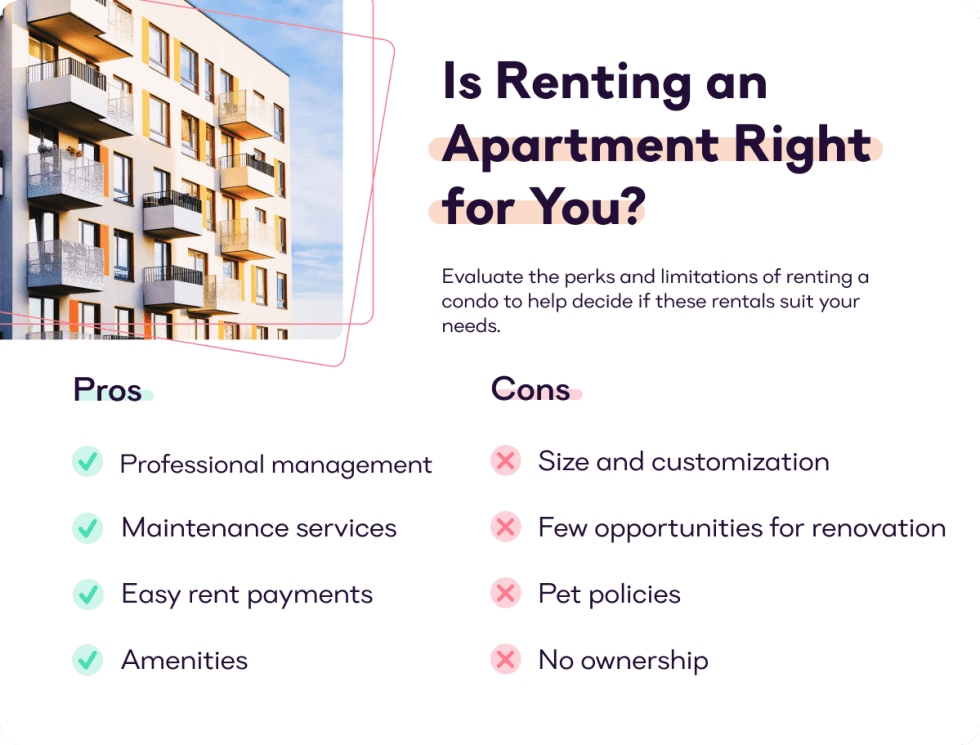- 47 units available
- 1 bed • 2 bed • 3 bed
- Amenities
In unit laundry, Hardwood floors, Dishwasher, 24hr maintenance, Stainless steel, Walk in closets + more

The biggest difference between a condo and an apartment comes down to who owns it. There are currently over 7.4 million condos in the U.S., which are usually individually owned and can sometimes be sublet by the owner; apartments are owned by a management company and rented out to residents. Both condos and apartments come with their share of pros and cons, depending on your goals.
If you want to build equity and have a stable place to live, you might want to own a condo. Or if you want to invest a downpayment elsewhere and enjoy having maintenance and amenities handled for you, choosing an apartment is probably the better choice, especially if you’re a first-time renter.
If you're a prospective renter, there's not much difference between a condo and an apartment. Condo owners frequently take on a landlord role and rent out their units. When renting in a residential building, the person who owns the unit is your landlord. Meanwhile, apartment buildings offer numerous rentals under the same management or ownership.
Buyers probably won’t notice the difference between a condo and an apartment building, and many people assume they can only buy condominiums. Apartments are often for sale as well, and you can look for them by visiting the websites of prospective apartment buildings or complexes.
Condominiums tend to have HOA fees associated with them for upkeep and security of shared spaces, especially for luxury units. Apartments may or may not have additional fees associated with shared spaces.
When you buy a condo, you’ll likely pay a monthly homeowners association (HOA) fee. This covers shared services like maintenance, landscaping, and amenities. But condo owners should also watch out for special assessments. These are unexpected, one-time charges that cover big expenses like a new roof or elevator repair. If you’re shopping around for a condo, always ask how often assessments have happened and what the HOA reserves look like.
In a condo building, rules are set by a condo association or board made up of other owners. They decide what’s allowed, including pet sizes, noise limits, or whether you can renovate your kitchen. You’ll need to follow these rules even though you own the unit. In an apartment, policies come from the property manager and tend to be more standardized. If having flexibility is important to you, ask about board restrictions before buying a condo.
| Key Differences | Condo | Apartment |
|---|---|---|
| Ownership | Owned by an individual | Owned/managed by a property management firm |
| Maintenance | Owner handles it (or hires someone) | Managed by onsite staff |
| Customization | More freedom to renovate | Limited or no customization |
| Fees | Monthly condo/HOA fees common | Usually just rent + utilities |
| Buying Options | Can buy or rent | Mostly rental; rarely for sale |
| Utilities | Paid separately by owner/renter | Often bundled/flat-fee included |
| Amenities | Varies—may be high-end | More standardized across units |
| Size/Layout | Often larger; may resemble a townhouse | Typically smaller and uniform in layout |
| Privacy | Potentially more, especially in townhouse-style units | Less privacy; closer proximity to neighbors |

Condos are individual pieces of property owned by an individual within a larger residential community. Renters lease apartments from property owners for a set amount of time established in a lease agreement.
Yes, condos are usually larger than apartments, as they often more resemble a townhouse or house than a traditional apartment. Not all condos are bigger than all apartments, however. There are plenty of sizable apartments out there.
Now that you understand the main difference between an apartment and a condo and the ownership structure involved, let’s look at the pros and cons of condo living.
Now that you understand the pros and cons of condo living, it’s time to look at the other side of the coin. Here are the pros and cons of renting an apartment.

Shopping for condos vs. apartments depends on your preferences, budget, and the city you live in. For example, you may find more condos for sale in Atlanta and apartments in New York City. But the process is mostly the same as any homeowner to acquire your new property.
If you’re looking for convenience and a straightforward rental agreement, an apartment might be the right choice for you.
Are you looking for the perfect apartment or condo to rent? Start on the search for your next place by taking Apartment List's easy quiz to get matched within your location, price, and choice of amenities!
Both condos and apartments can be great choices depending on what you're looking for. It may also come down to the kind of deal you can get in your area. But the bottom line is that if you want maintenance, amenities, and better deals, go for apartments. For a great deal on property you can own as well as community amenities, try a condo.
Condos are sometimes built with more natural space in between, or with better distributed space, in order to increase privacy. This also makes them generally quieter than apartments. For instance, condos arranged as townhouses will often be naturally quieter than apartments surrounded by a unit on multiple sides.
Condominiums often share walls or floors with neighbors, so how well insulated and built your condo is will determine how much of your neighbors' activity you can hear. Even the most well-insulated condos may allow you to hear one another from time to time.
If you own your condo, you are probably allowed to soundproof it. Double-check with the condominium association about the requirements in order to get an idea of how much structural change you can make to your building.





In unit laundry, Hardwood floors, Dishwasher, 24hr maintenance, Stainless steel, Walk in closets + more
In unit laundry, Granite counters, Pet friendly, Stainless steel, Walk in closets, Gym + more